How a neurodiverse team came to interview President Tharman, celebrities on The Assembly
A neurodivergent team’s foray into journalism sparks questions ranging from why singer Kit Chan kept her divorce under wraps to why Joakim Gomez is still single at 36. Here is a behind-the-scenes look at CNA series The Assembly.
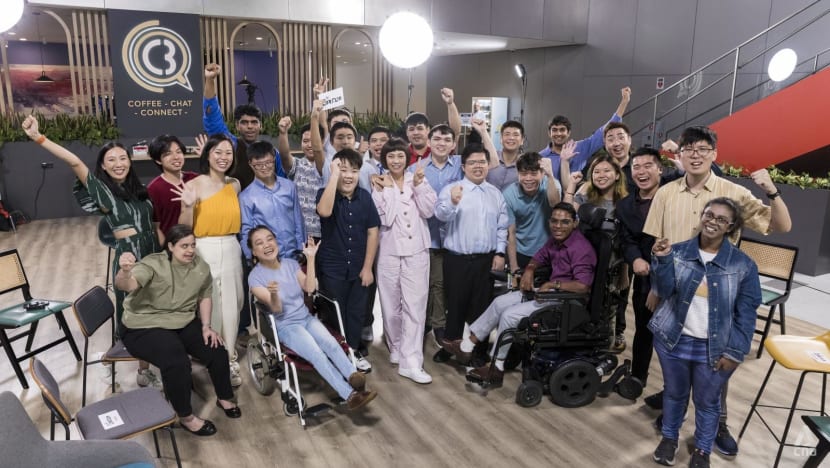
The atypical team of The Assembly with singer Kit Chan (centre), their guest on the series’ third episode, which aired last night. (Photo: Christopher Wong for CNA)

This audio is generated by an AI tool.
SINGAPORE: When Li Shu Yun first learnt that her son, Allan Cai, would be joining a neurodivergent team conducting no-holds-barred interviews with prominent figures, she felt worried.
As the mother of a son with Down’s syndrome, she feared he might ask direct and potentially awkward questions about sensitive topics, such as age and marriage.
But she soon realised that her initial fears were precisely what made The Assembly — the series the team would be part of — unique.
“Rule number one … there’s no such thing as stupid questions,” said Grace Lee-Khoo, facilitator and mentor to the budding journalists, during their first workshop. “The heart of this show is for you all to be yourselves.”
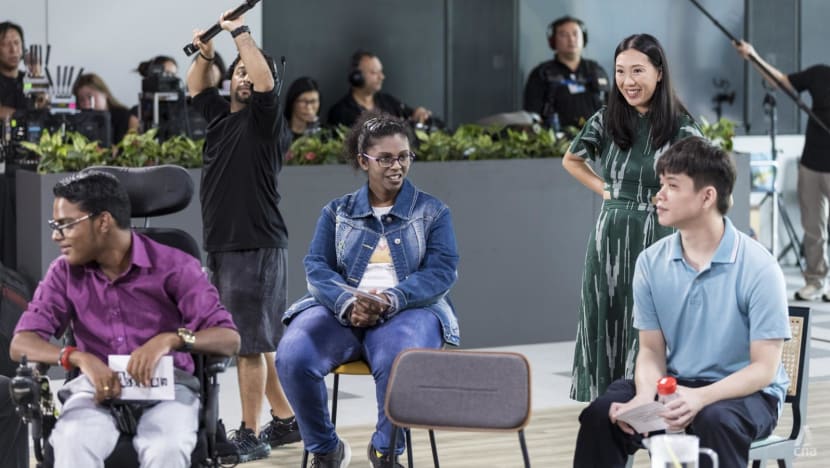
Three workshops introduced the participants to the fundamentals of journalism, from crafting meaningful questions to learning how to frame them effectively.
“The whole environment here (was) very relaxed,” Li observed after one session. “They could ask questions without thinking, ‘Am I asking a wrong question?’ (It was) a very rare and a really golden opportunity for all of them.
“It was refreshing.”
The Assembly brought together 23 atypical individuals aged 14 to 44 and from all walks of life — such as teachers, students, nurses and musicians — each with conditions such as autism, cerebral palsy or dyslexia.
Week after week, through the workshops, which later included guest-focused workshops, they honed their interviewing skills and the art of conversation.
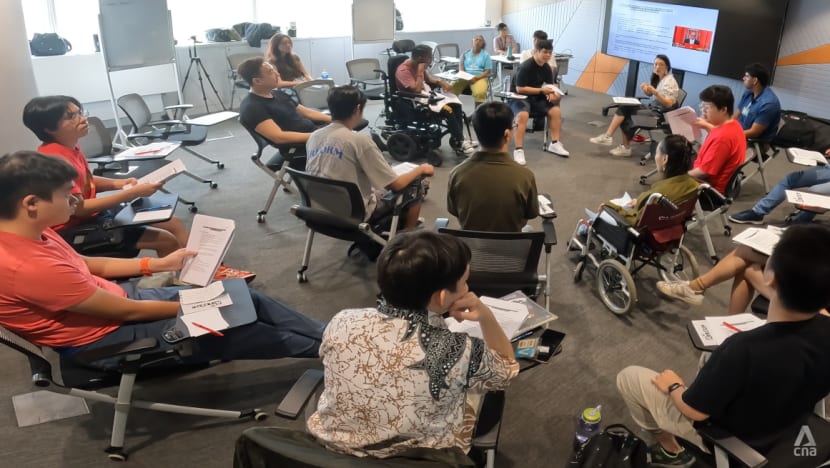
One key challenge was overcoming the discomfort of asking personal, probing questions — a task that aspiring journalist Stephanie Fam embraced.
“I asked (Kit Chan) whether she was ashamed of her divorce,” cited the 39-year-old with cerebral palsy. Though she expected that Chan would “dislike” the question, she believed it was important to ask.
“As a journalist, you must try your best to get answers even though the person you’re interviewing might not exactly answer your question.”
Fam’s approach encapsulates the essence of The Assembly: A commitment to courage and honesty. Here’s a glimpse into the creation of the five-part series and its significance for the participants and their families, from pre-show jitters to blossoming friendships.
WATCH: How we took a crash course on grilling Singapore celebrities and VIPs | Making of The Assembly (13:52)
BECOMING JOURNALISTS
While the first three workshops covered journalism basics such as asking open-ended and follow-up questions, it was in the later workshops, held each week before filming, that these skills came to life through guest-specific research.
After participants received an information deck on their guest — eagerly taking turns reading it aloud — and did their own research, they dove into brainstorming and narrowing down their questions to the most insightful one or two.
Some participants, like 26-year-old Cai, a National Day parade fan, went above and beyond. He was particularly excited to interview Chan, famed for her National Day song, Home, and immersed himself in researching her work.
By the end of the week, he could sing many of her songs, even those his mother had not heard of.
Others shaped their questions from personal experience. Vincent Ng — who had faced childhood abuse, due in part to his autism spectrum disorder — asked President Tharman Shanmugaratnam about the latter’s relationship with his father.
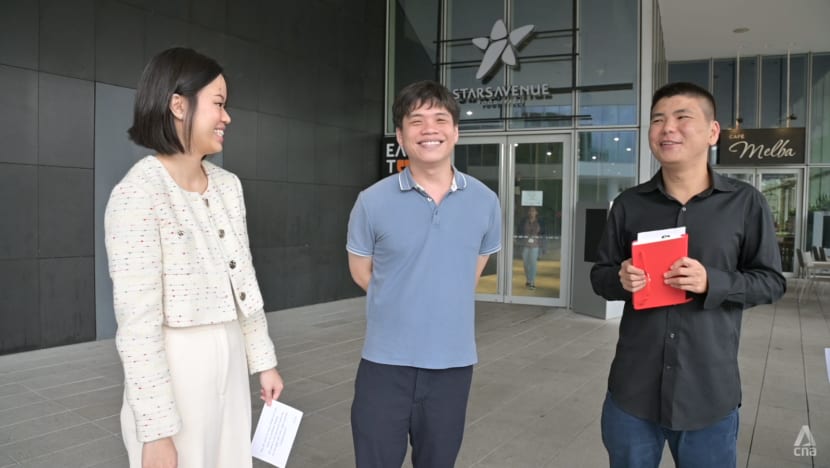
Filmer Tan, 23, who struggled to talk to girls, asked radio deejay Joakim Gomez if the latter had ever felt the same way.
Some questions that were not ready for the spotlight were refined. “It’s also about effectiveness,” Lee-Khoo said.
We honour their curiosity, … but we help them pare it down so that it’ll achieve its purpose (of) getting a really good answer and in-depth engagement out of that interviewee.”
Once they had their “golden questions”, participants were encouraged to memorise and rehearse. Still, there were nerves on edge. “(My) heart (was) pumping very fast,” Ng said with a laugh. “I sometimes couldn’t sleep in the middle of the night.”
It has been an “emotional roller-coaster” for 24-year-old Trevor Lee, also on the spectrum. “I honestly didn’t think that we’d get to talk with anyone from the government, let alone the president,” he said.
“For us to be able to talk with him is mind-blowing.”
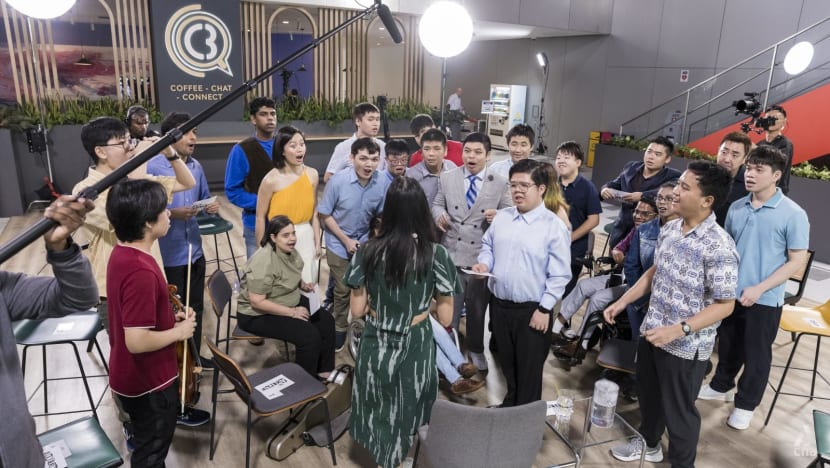
Prithviraj Kumar Basu and Mubarak Muswal, who both have autism and were chosen to give the opening and closing remarks respectively for the episode with the president, felt even greater pressure.
“When you meet President Tharman, you have to be calm. You have to be formal. It can’t be like how you might ask other celebrities, because President Tharman is the head of state,” said Mubarak, 19.
Despite the nerves, they, like the rest of the team, powered through with the support of their peers, with cheers of encouragement ringing out throughout the interviews.
“I was really nervous, … but I’ve gotten over it,” said Basu, 26. “I’ve learnt that while Tharman is our president, … we can also treat him as a friend, as a regular human being.”
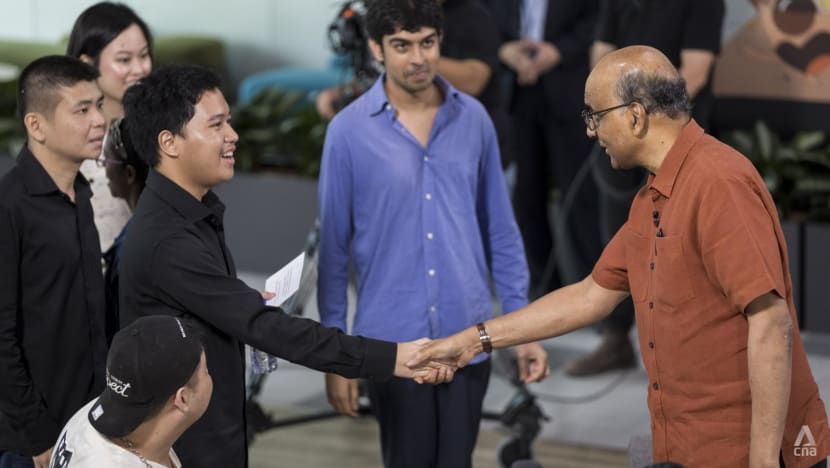
FRIENDSHIPS AND SELF-IMPROVEMENT
Besides chatting with the who’s who, friendship turned out to be one of the group’s cherished takeaways. “The most memorable time was back during the bonding sessions when we (got) to … talk to each other,” Mubarak said.
Indeed, making new friends, and not only interviewing guests, was one of the main reasons Joel Lee joined The Assembly. “I got way more than I wanted, to say the least,” said the 27-year-old, who has an autism spectrum disorder.
He even struck up a bromance with Ng, 28, and Durkeswaran Krishnan, 18, who has cerebral palsy, when the latter’s wheelchair battery started running low.
“My wheelchair was going very slowly, so they offered to push me to the MRT station,” Durkeswaran recounted, remarking that the combined weight of him and his mobility aid was about 170kg.
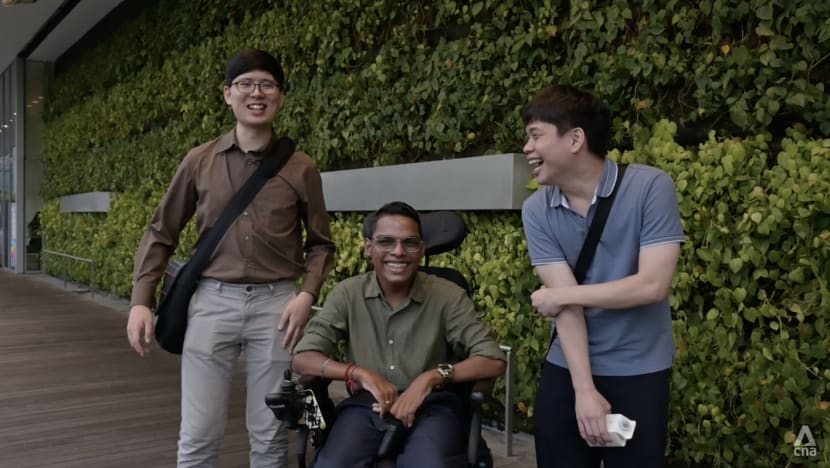
“I think it’s a little bit difficult for him,” Ng said, “because we were walking under the hot sun … so (Joel and I) took turns pushing his wheelchair.”
Durkeswaran, who grew up as the only person with disability in his mainstream classrooms, said reflectively: “I feel like it’s a new circle (of friends).”
Alongside newfound camaraderie, participants found themselves applying what they had learnt in their journalism crash course to everyday life.
To his family’s delight, Cai became a better conversationalist at home as he asked more open-ended questions like, “How was your day?” His mother said: “The workshops are super, super helpful not only for … events, but also for his life.”
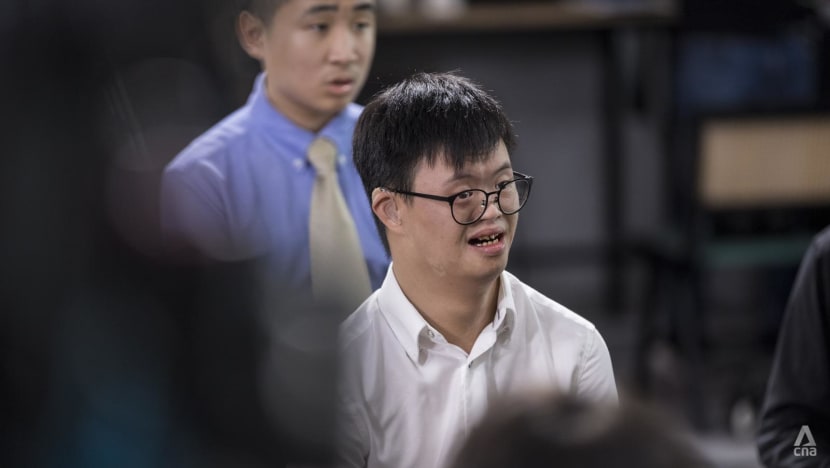
Emily Yap, a senior staff nurse with dyslexia, also started asking her patients and colleagues better and more pointed questions. “I’m a good listener,” she said. “But I may not (have been) the best person to … ask more questions.”
For 24-year-old Gaayatri Ramakrishnan, who is intellectually disabled, there was a shift in her attention span, noticed her uncle, K Arumugam.
“She doesn’t really listen (when people talk). She starts to divert (her attention), yawn away. But today I saw her, (and) she didn’t do any of that,” he said after the filming of episode three, which aired last night.
And in Rainer Khoo’s case, though the 26-year-old had never been interested in learning to read, his journey on The Assembly sparked a desire to improve.
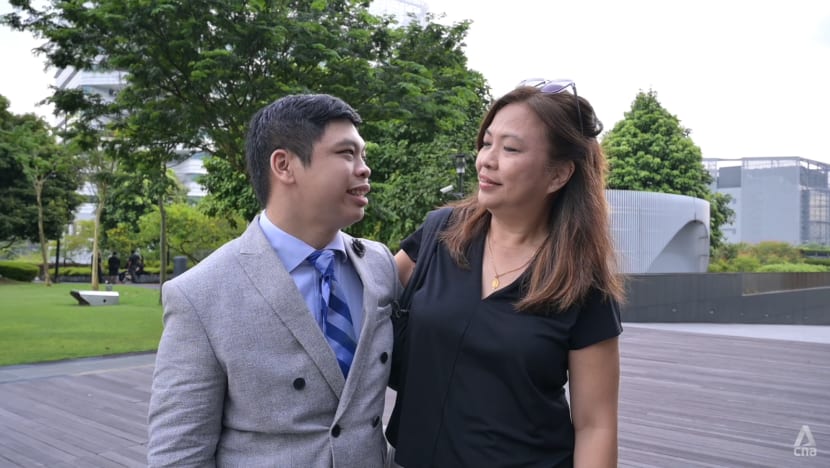
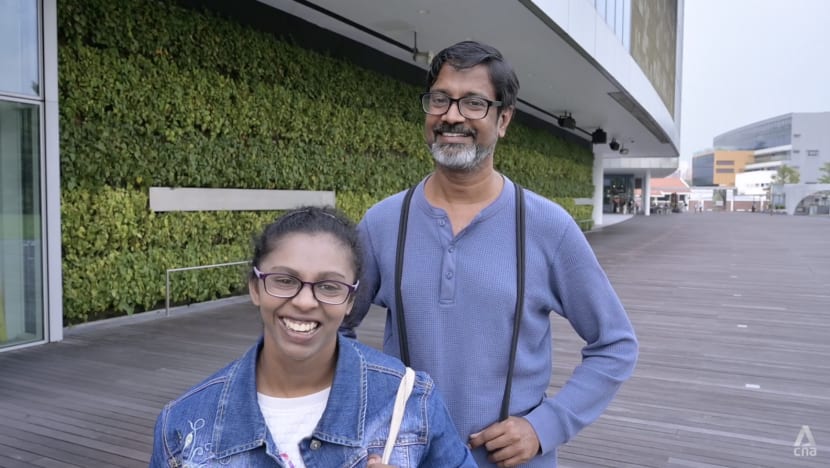
For instance, when he was tasked with delivering opening remarks for the third episode, he asked his mother to write it down and paste on a wall for him to learn.
“I want to learn how to read, how to spell, and I want to ask more questions,” affirmed Khoo, who has William’s syndrome, a genetic disorder.
A FORCE “TO BE RECKONED WITH”
Not only is The Assembly about personal growth, it also is an opportunity for the disabled community to explore their potential and show what they can do — that is how Fam sees it.
“We can do many things that the non-disabled community can do. It’s just that we don’t have enough opportunities,” she said.
She highlighted the team’s attention to detail, especially when it came to crafting questions. It was the kind of journalistic skill she had always wanted to develop but thought was out of reach owing to her disability.

So for her, the series is a chance of a lifetime. “I guess the universe brought me here for a reason,” said Fam, who would love to work in a newsroom one day and “tell stories that are normally unheard-of”.
Some of the neurodivergent individuals found themselves in the spotlight also when they showcased their various musical talents in front of the guests.
“Even though we have a disability, it’s not going to stop us from strengthening ourselves (and) proving that we also can contribute to society,” Ng said.
Trevor Lee hopes the series will help viewers see that anyone, regardless of ability, can have meaningful conversations and “a good time”.
“We may be disabled,” Joel Lee added, “but one way or another, our abilities and our strengths shine forth in the midst of trials. … We’re a community to be reckoned with.”
Watch the latest instalment of The Assembly, featuring Kit Chan, here. Catch the next episode, featuring Joakim Gomez, next Wednesday at 9pm.





















